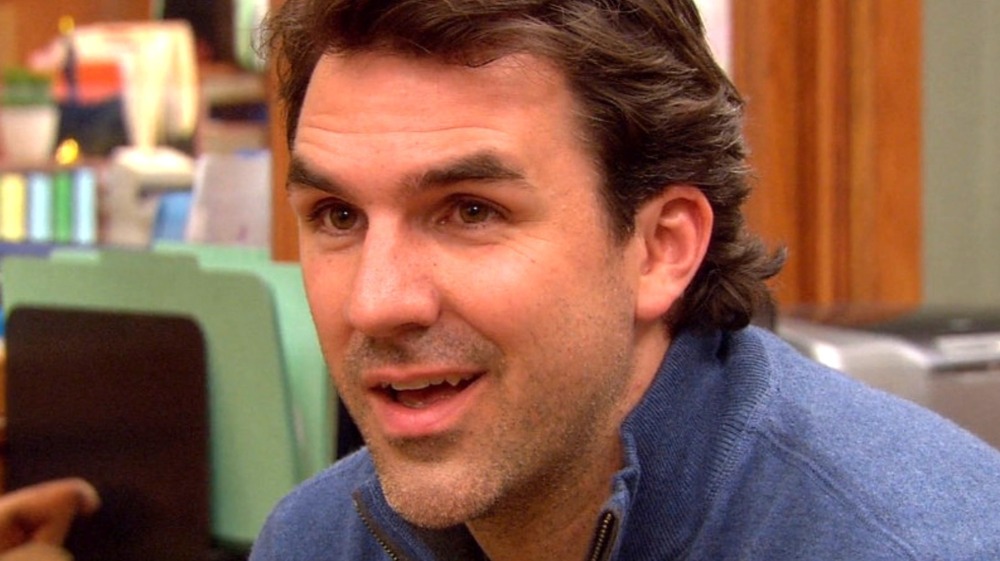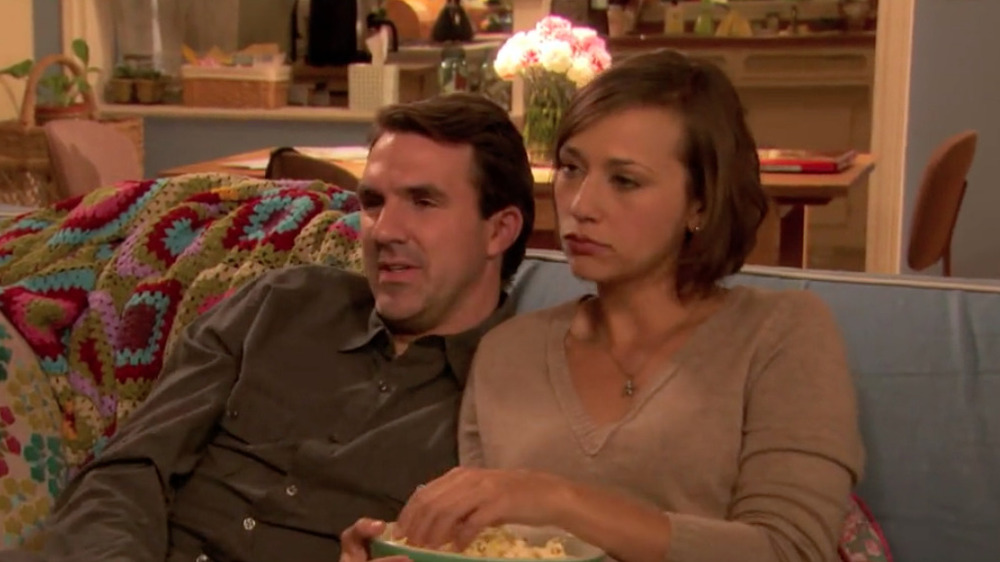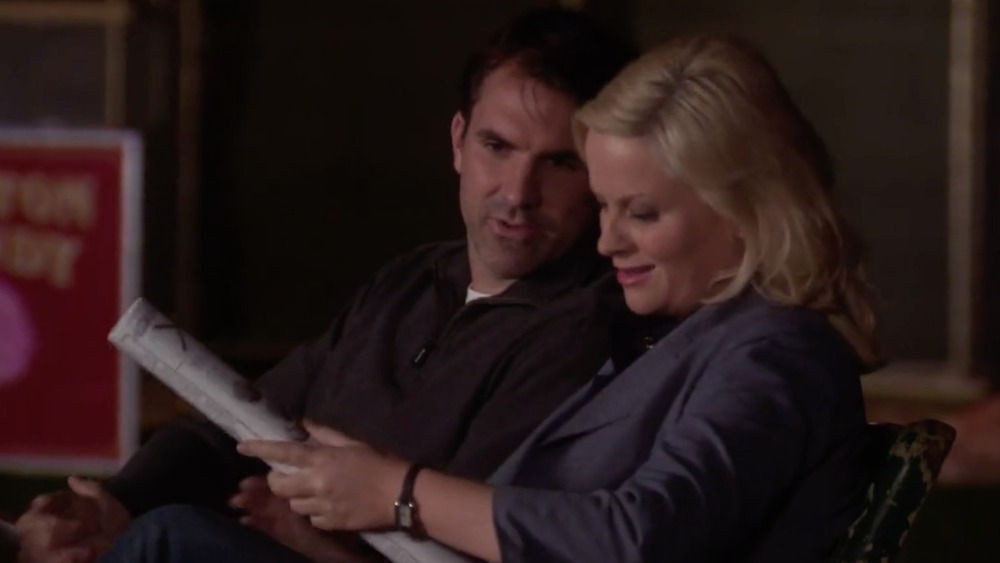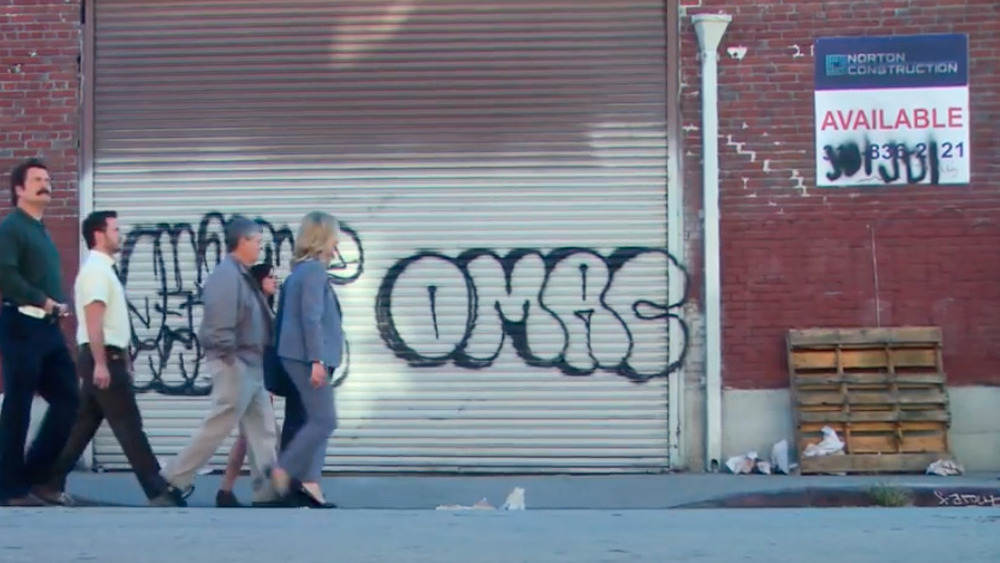The Mark Brendanawicz Theory That Changes Everything On Parks And Recreation
Parks and Recreation brought us numerous beloved characters whose friendship, humor, and perseverance won our hearts. The show is still so influential that every year the real-world organization Engaging Local Government Leaders honors a top local government site with "The Knope Award," and last year Fernridge Park in West Hartford, Connecticut, named its newest building the "Leslie Knope Promenade" (admittedly after a generous donation from the show creator).
Although there are some Pawnee residents we will always remember, there's also one who we often forget: Mark Brendanawicz. Played by Paul Schneider, Mark was a jaded and disillusioned city planner who had a brief fling with Leslie prior to season 1 and abruptly exited the show at the end of season 2 for a job in the private sector. Viewers have been trying to make sense of his disappearance for years, and though there were reasons for the decision behind the scenes, his departure continues to be a point of bewilderment for many.
Now, one fan theory highlighted by Screen Rant seems to answer all our questions. If you ask certain Parks and Rec enthusiasts, they'll tell you what just might be a dark truth: Mark Brendanawicz killed himself.
Mark left a trail of broken relationships in his wake
This may initially seem like a deranged idea, but there's plenty of evidence to support the theory. Mark is presented as a lonely character whose selfish behavior continuously alienates him from others. For example, at the end of the first season, he impulsively kisses Leslie, who's been harboring feelings for him for years. When she stops the encounter because they've been drinking, he replies, "Leslie, it's not that big a deal." Despite being fully aware of her unrequited feelings, he still completely disregards the emotional fallout for Leslie and disrespects their friendship by putting her in this position.
Furthermore, in the season 2 episode "Practice Date," we learn that when Mark was 16 he had an affair with an older married woman. It's possible that experience was the reason he became a serial philanderer with commitment issues as an adult. To his credit though, when he starts dating Ann Perkins, he does make a sincere effort in that relationship. Unfortunately, the day he plans to propose marriage, she dumps him. Blindsided by the breakup, he asks for an explanation and she responds, "You're supposed to miss the person even if they're only gone for 20 mins and I just didn't feel that — did you?" Mark pointedly doesn't answer the question, as it's clear he was genuinely in love for the first time in his life and this split is a brutal blow. After years of meaningless flings he finally found someone he wanted to marry, only to learn she didn't feel the same way.
Mark tried one last time to make his mark on the world with Leslie's park
Career-wise, Mark is similarly unfulfilled and makes no secret of how much he hates his job. Plagued by his ineffectual position, he remarks that his greatest accomplishment was lowering a speed bump by two inches. Once hoping to design impressive cities, he now spends his days dealing with red tape and regulating the size of garages.
Show creator Michael Schur said in a 2010 interview that he thought Mark was the foil for Leslie and "a good way to illustrate both the positive and negative aspects of working for a government." So it would make sense that the more hopeful Leslie is, the more hopeless Mark becomes. In his last episode, Mark gifts Leslie blueprints he made for her as-yet unrealized park project. In essence, this could be considered a suicide note. His final effort to make a statement before calling it quits. The fact that Leslie later begs the public for help designing the park in season 5 only goes to show how uninspired and second-rate Mark's plans must have been. Ouch.
The company Mark went to work for is still in business and based in Pawnee years later
But couldn't Mark have just moved on to a new job? The reason that's unlikely is because we literally never see him again — in any capacity. The company he says he's leaving for, Norton Construction, is still based in Pawnee, a city of about 80,000 people with an approximate area of 27.6 square miles. It's not a huge place. If you know someone who lives there you're going to run into them, but we never do in the subsequent five seasons. It's also unlikely that the company went under or moved locations, since a sign for Norton Construction is seen in the background of the episode "Save J.J.'s" in season 7. They're still in business and still in Pawnee.
Ultimately though, the most glaring indicator that Mark didn't simply start a new life is the fact that after his exit, no one acknowledges his existence ever again — not once. No throw away joke referencing his character, no flashback including him, no casual mention of him in conversation. After scouring the series the only hint of his presence to be found after season 2 is a painting he made in the episode "The Camel" hanging in Ron's office. Other than that, he's been almost completely erased. The only way this would make sense for the story is if, out of respect to Mark's family and the tragic circumstances of his death, the employees actively decided to never mention him again to the documentary crew. If he had moved away, died of natural causes, or passed away in an accident, there wouldn't be such a shroud of secrecy around his absence.
This would also mean that for Leslie completing the park Mark helped her build wasn't just a personal goal, but a tribute to the memory of a fallen colleague... who definitely killed himself. At least, if you believe this particularly dark fan theory.
If you or someone you know is having suicidal thoughts, please call the National Suicide Prevention Lifeline at 1-800-273-TALK (8255) or text HOME to the Crisis Text Line at 741741.



